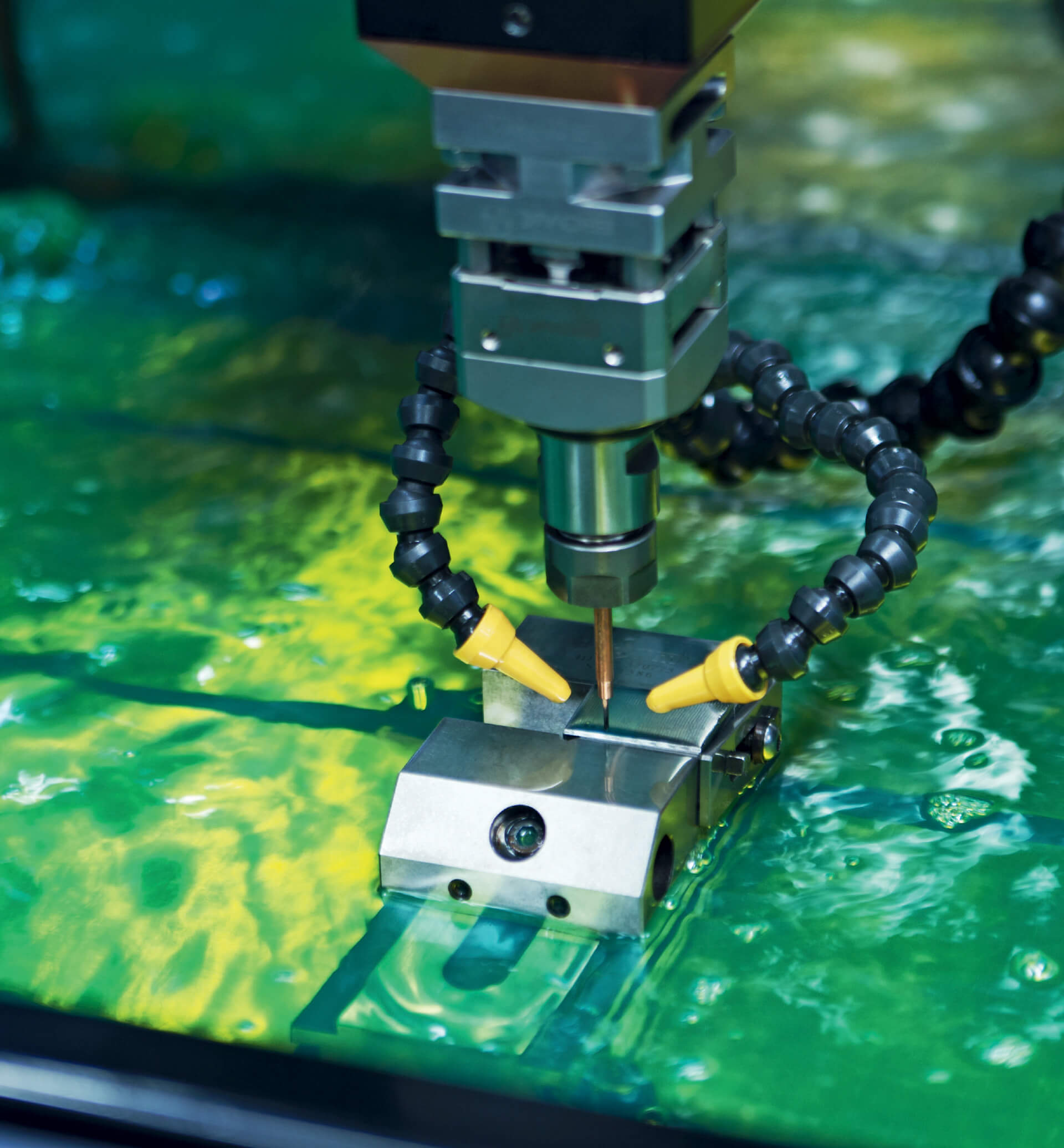
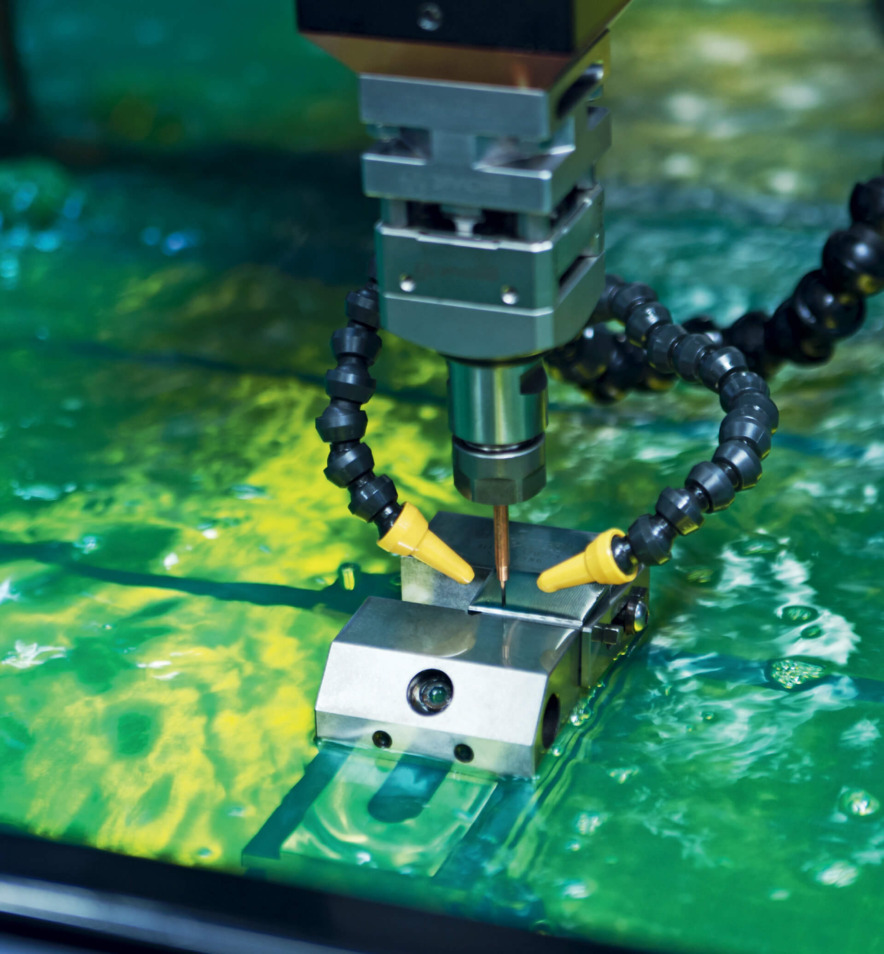
At ICT-IMM, potential users can find out about the advantages of different processes, e.g. wire cutting and die sinking.
Professor Dr. Michael Maskos, Director of Fraunhofer ICT-IMM and previously Managing Director of Institut für Mikrotechnik Mainz GmbH, is thoroughly satisfied with the planned integration. “For us at ICT-IMM, this is a watershed and proof that we’ve been doing a good job of work over the years.” The way was paved by the Land Rhineland-Palatinate and the Fraunhofer-Gesellschaft to which the research and development institute launched in 1990 will be admitted. The goal is successful evaluation. Until 2018, integration will be actively supervised by the Fraunhofer Institute for Chemical Technology (ICT) in Karlsruhe-Pfinztal.
“The IMM was founded to satisfy the desire in the region for a pooling of precision machining expertise. Implicit in its founding was the intention to support small and medium-size companies that are unable to conduct research in this field themselves because of the associated high cost,” says Maskos looking back. “Since our launch, we at IMM have been giving potential users the opportunity to find out about the advantages of different processes on our premises.” This also applies to wire cutting and die sinking machines from Mitsubishi Electric that IMM has been using since 2007. This was when the institute established its EDM Competence Centre and invited Mitsubishi Electric to participate as an active cooperation partner for micromachining in wire cutting and die sinking. The goal is to expand the knowledge and technical possibilities of both sides and maintain the respective leading positions in the market. Above all, they aim to jointly help users to optimise existing standard technologies so that they can transcend their own production boundaries and thus expand considerably their range of products and services.
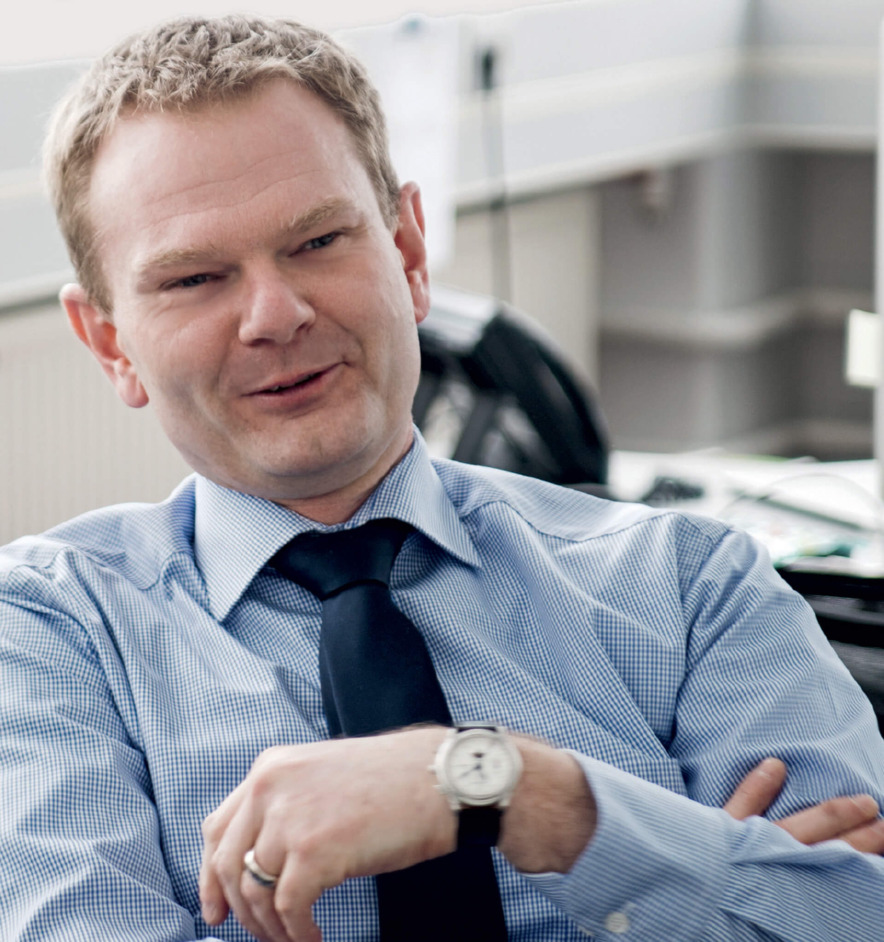
Professor Dr. Michael Maskos, Director of Fraunhofer ICT-IMM, sees the planned integration in the Fraunhofer-Gesellschaft as proof of the good job of work that his team has done over the years.
The branches of industry for which Fraunhofer ICT-IMM conducts development work in the microproduction sector include the automotive and aviation industry and medical technology. The institute wishes to refine technologies so as to shorten machining time and improve quality and process security. Quality rather than quantity is called for. With over 15 years of experience in micromachining, Fraunhofer ICT-IMM is able to achieve outstanding results in tandem with its high-performance partners. Maskos points up in the air: “Components from our institute can be found on Mars – for instance, a parallelisation system for X-ray spectrometers.” Microproduction technologies are required when it’s a question of the efficient development and production of individual precision parts, subassemblies and complex systems. Fraunhofer ICT-IMM works with almost all types of materials, from plastics to high-alloy steels and hard materials. For this, the institute uses a broad range of production technologies, which it can flexibly combine in any order. Fraunhofer ICT-IMM can thus create a basis for the development of machining strategies and extending the scope for the production of microcomponents and -structures. In addition to this, by pooling research and development expertise on the one hand and production know-how on the other, the institute offers its partners access to customised microsystem technology solutions transcending commercially applicable standards. In addition, by combining methods and processes from different fields of technology, further and unconventional approaches can be explored for the development of applications. All in all, Fraunhofer ICT-IMM covers the entire spectrum of services – from advice, design and engineering through to production and assembly. A strict eye is kept on feasibility and cost-effectiveness at all steps in the process. A key contribution to success is also made by the experienced employees of the institute with their interdisciplinary outlook.
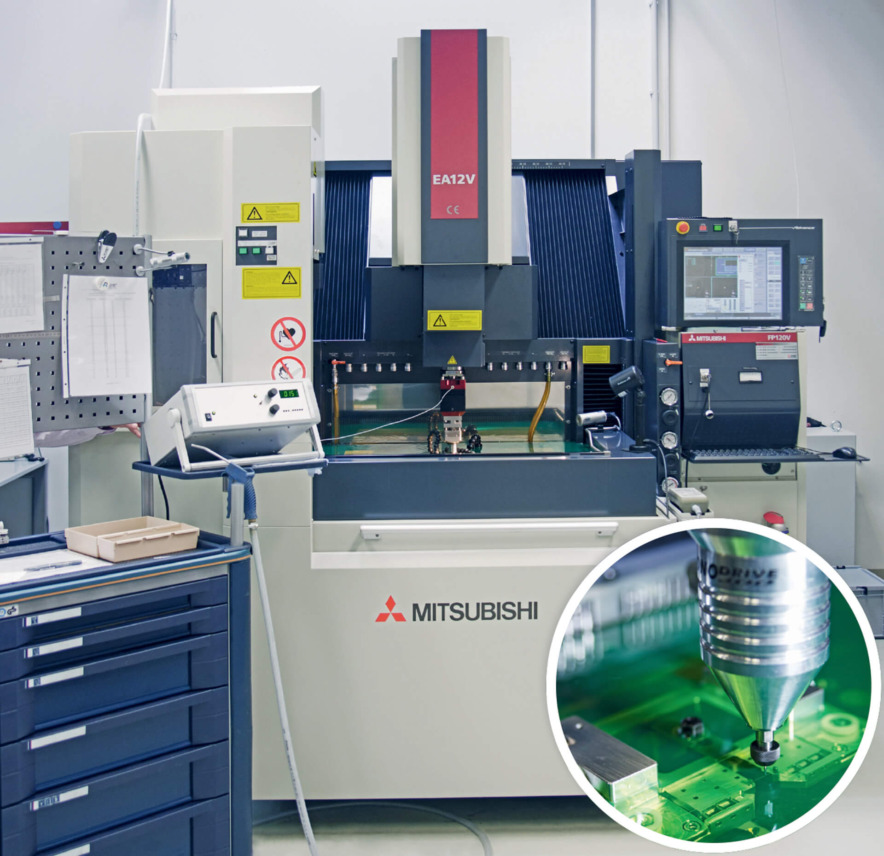
Thanks to a livelier technological exchange, Mitsubishi Electric will also benefit from IMM’s integration in the Fraunhofer-Gesellschaft.
“In our cooperation with Mitsubishi Electric, we have been engaging in a successful, close technology partnership for many years,” Maskos stresses. “This has involved putting the company’s new EDM machines through their paces before their market launch in Europe and, in the border area of microstructuring, technologically assessing the machines for their marketability and reliability in tests and applications. This is where we have worked at length on technology tables, explored the technological boundaries and, in a joint effort with partners from Japan, rolled these boundaries back. It’s exciting to see the performance and precision that can be squeezed out of the machines outside standard applications with skilful process control.” In 2013, IMM again reiterated its aspiration to be at the forefront of future themes of relevance to society by establishing its competence area Microstructure Technology for Nanoparticles (Micro4Nano). “By taking this step, we are plotting a growth course. In other words, we are securing jobs for highly skilled people and possibly creating further new jobs in the medium term,” Maskos explains. In the nanotechnology field, it is for Fraunhofer ICT-IMM primarily a question of nanoparticles in solutions. Reproducible results, achieved by the institute in specially developed processes, are a challenge in this field. One of the stepping-stones is micromachining. “But we’re interested not only in inventing things, but also in putting the findings into practice,” says Maskos. “We therefore make full use of the diversity of expertise in our team, which is one of the unique features of our institute.” IMM can be proud of what it has already achieved. Maskos: “We are ahead of the field in many technological areas where high-precision parts are concerned. Examples of these are the components for a research satellite with a detection accuracy of 30 m which is due for launch in 2016.”
“In our cooperation with Mitsubishi Electric, we have been engaging in a successful, close technology partnership for many years.”
Maskos emphasises that Fraunhofer has very strict rules for the admission of a new institute. So he is justifiably proud to see his IMM on its way to becoming a Fraunhofer Institute in its own right. “We’ve worked hard to build up the necessary confidence. For instance, by founding 18 new companies, 16 of which are still going strong. We establish start-ups from internal units as soon as they become profitable. This is how we, as a non-profit institution, also create high-grade jobs.” Against this background, Maskos and his team are looking forward to integration. With the support of Fraunhofer and the Land Rhineland-Palatinate, the institute plans to extend its premises in 2016 and thus broaden its technical capability. They will then have more space for their work and will be able to achieve more in the EDM sector in the long term. All the partners of the institute also ultimately benefit from integration in the Fraunhofer-Gesellschaft. The advantages include a livelier technological exchange, an abundance of conceivable new cooperative ventures and the modernisation and extension of infrastructure. Maskos: “We are also extending our core competences and our spectrum of services to make us more attractive for new customers.”
(The next issue of Profile will include a supplementary article on Fraunhofer ICT-IMM’s cooperation with Mitsubishi Electric which will shed light on the technical aspects of cooperation.)
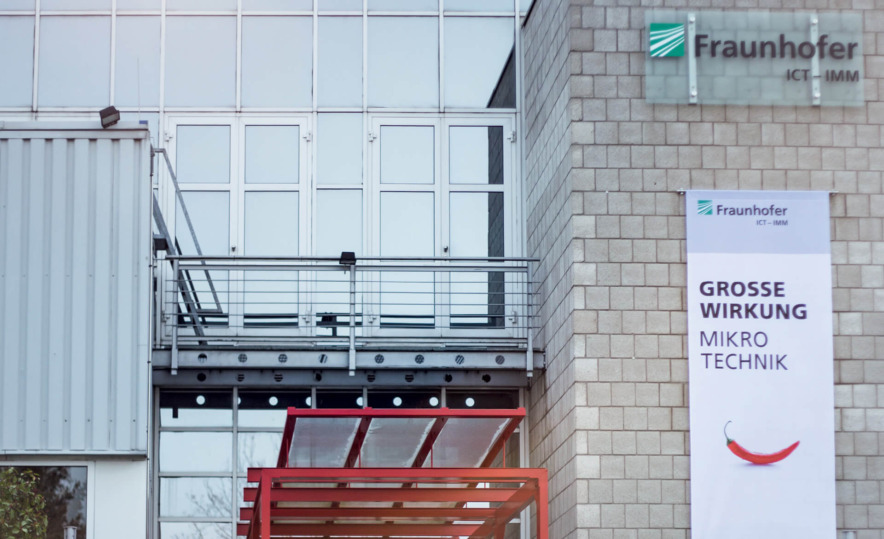
Fields marked with a * are mandatory.
Mitsubishi Electric Europe B.V.
German Branch
Mitsubishi-Electric-Platz 1
D - 40882 Ratingen
Sales
Tel.: +49 (0)2102 / 486 - 6120
edm.sales@meg.mee.com
Service
Tel.: +49 (0)2102 / 486 - 7600
edm.hotline@meg.mee.com
Applications
Tel.: +49 (0)2102 / 486 - 7700
edm.applikation@meg.mee.com
Spareparts
Tel.: +49 (0)2102 / 486 - 7500
edm.parts@meg.mee.com